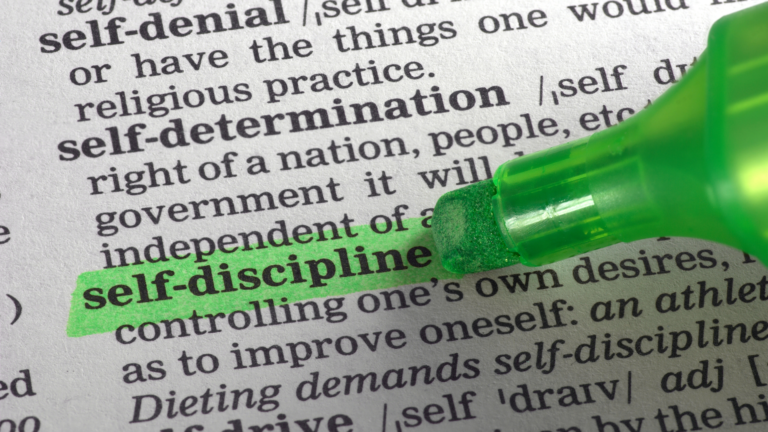Self-care or self-sabotage? Learn how to stop negotiating with comfort, build discipline, and make choices your future self will thank you for.
Are You Honouring Yourself or Negotiating with Comfort?
“Listen to your body.” It’s one of the most common pieces of advice in wellness, but let’s be honest—if we only did what felt good, we’d be hitting snooze instead of journaling, ordering takeout instead of cooking, and scrolling social media instead of building the life we actually want.
There’s a fine line between self-care and self-indulgence. True self-care isn’t about giving in to every craving or urge—it’s about doing what your future self will thank you for. If you’ve been conditioned to prioritize ease and comfort, “listening to your body” can quickly turn into avoiding the very things that lead to growth.
So, how do you find the balance? How do you know when to push through and when to pause? Let’s get into it.
The Comfort Trap: When “Listening to Your Body” Holds You Back
Your brain is wired for survival—it craves pleasure, avoids pain, and conserves energy. That’s why comfort feels so right. But comfort isn’t always good for you.
If you’re used to choosing ease over effort, your body will naturally crave:
- Skipping workouts
- Sleeping in instead of tackling morning habits
- Ordering fast food instead of preparing something nutritious
- Avoiding difficult conversations in relationships
- Procrastinating on tasks that move your career forward
But here’s the truth: your body and mind crave what they’re used to. If you’ve built habits around ease and indulgence, you’ll default to them. If you’ve built habits around consistency and growth, those will become your norm.
Signs You Might Be Negotiating with Comfort Instead of Caring for Yourself:
- You skip workouts because you’re “too tired,” but you’re not prioritizing sleep.
- You justify bad financial decisions with “you only live once.”
- You let emotions dictate your choices instead of long-term goals.
- You tell yourself you’ll “do it tomorrow”—but tomorrow never comes.
- You bail on commitments to yourself but follow through for others.
Sound familiar? Let’s shift the mindset.
The Power of Discipline: Making Choices for Your Future Self
Discipline isn’t about restriction—it’s about self-respect. It’s choosing what serves your highest potential instead of what feels good in the moment. It’s honoring your vision, your energy, and your long-term success.
Think of the future version of yourself who is thriving—mentally, physically, and financially. Do you think that person got there by giving in to every impulse? No. They got there by choosing consistency over comfort.
1. Stop Negotiating with Yourself
Your mind is a master negotiator. The moment discomfort kicks in, it starts working against you:
🚨 “You’re too tired. Just skip today.”
🚨 “You deserve a break. One day won’t hurt.”
🚨 “Start fresh on Monday.”
The problem? The more you negotiate, the more power you give to excuses.
How to Win the Negotiation Game:
- Decide in advance. Make decisions for your future self so there’s no debate in the moment. (Example: Your workout time is set like an appointment—you don’t cancel.)
- Eliminate wiggle room. Set clear non-negotiables. If you planned a work session, you sit down and do it. If it’s meal prep night, you cook—no second-guessing.
- Use the “Two-Minute Rule.” If you feel resistance, commit to just two minutes. Start the task, and momentum will follow.
2. Discipline Should Feel Like Self-Trust, Not Punishment
Discipline isn’t about forcing yourself—it’s about trusting yourself. You don’t question brushing your teeth every morning; it’s just what you do. The same can apply to working out, journaling, budgeting, and maintaining strong boundaries.
The more you follow through on your commitments to yourself, the more you build self-trust—and when you trust yourself, motivation becomes irrelevant.
Action Tip: Each time you keep a promise to yourself, acknowledge it. (“I said I’d wake up at 6 AM, and I did. That’s who I am now.”)
3. Know the Difference Between Rest and Avoidance
There’s a massive difference between intentional rest and avoiding discomfort. Rest is refueling. Avoidance is escaping.
Self-Care vs. Self-Indulgence:
✅ Self-care: Taking a rest day because your body needs recovery.
❌ Self-indulgence: Skipping the gym because you don’t feel like going.
✅ Self-care: Eating a nourishing meal that supports your goals.
❌ Self-indulgence: Binge-eating junk food and calling it “balance.”
✅ Self-care: Taking a break from social media to protect your mental space.
❌ Self-indulgence: Avoiding difficult conversations and calling it “protecting your energy.”
Action Tip: Before making a decision, ask yourself: “Is this truly supporting me, or is it just an easier option?”
4. Act Like the Person You Want to Become
Your habits create your future. If you always act based on your current feelings, you’ll stay exactly where you are. But if you start making decisions as the person you want to become, transformation happens fast.
- Want to be fit? Move like someone who prioritizes health.
- Want to be wealthy? Spend and invest like someone who values financial freedom.
- Want better relationships? Communicate and set boundaries like someone with high self-worth.
Action Tip: Each morning, ask yourself: What would my future self do today? Then, do that.
The Future You is Built on Today’s Choices
Every time you choose discipline over comfort, you’re casting a vote for the person you’re becoming. You don’t need to feel motivated—you just need to follow through.
So the next time you catch yourself negotiating, ask:
“Is this the choice my future self would make?”
If the answer is no, you already know what to do.
With love and fire,
Karolina

